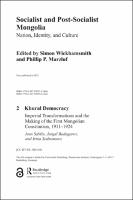Chapter 2 Khural Democracy
Proposal review
Imperial Transformations and the Making of the First Mongolian Constitution, 1911–1924
Author(s)
Sablin, Ivan
Badagarov, Jargal
Sodnomova, Irina
Language
EnglishAbstract
The political system of early socialist-era Mongolia, established by the first Constitution in 1924, can be interpreted as a vernacular version of the Soviet system, in which the formally supreme representative body, the State Great Khural (“assembly”), was sidelined by the standing Presidium of the Small Khural and the Cabinet, and eclipsed by the non-constitutional party authorities. The establishment of this sham and nominal parliamentary system was a consequence of the Bolshevik new imperialism, the inclusion of the Mongolian People’s Republic into the informal Soviet empire, which occurred through both military control and structural adjustments under the supervision of the Communist International. The 1924 Mongolian Constitution, however, was not a mere copy of its Soviet 1918 and 1924 counterparts but a transimperial document. In its text and especially in the history of its making, it reflected the entangled imperial transformations of the Russian and Qing empires and featured both indigenous (Khalkha and Buryad-Mongol) agency and vernacular political discourses. Khural existed as a non-representative yet deliberative consultative assembly in 1914–1919, while Tsebeen Jamtsarano attempted to make a Mongolian khural one of the many world parliaments, even though his draft constitution was affected by the practices of revolutionary Russia.
Keywords
culture, identity, Marzluf, Mongolia, nation, P, Phillip, post, post-socialist, Simon, socialist, WickhamsmithISBN
9780367350574, 9780367695033Publisher
Taylor & FrancisPublisher website
https://taylorandfrancis.com/Publication date and place
2021Grantor
Imprint
RoutledgeClassification
Ethnic studies


 Download
Download Web Shop
Web Shop